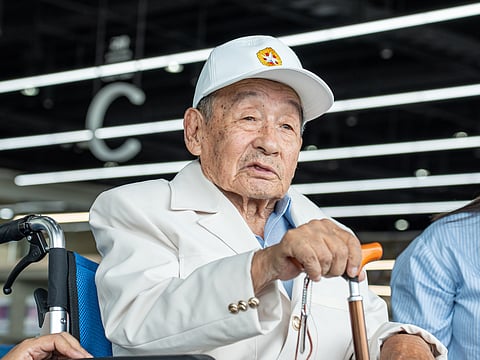
- NEWS
- the EDIT
- COMMENTARY
- BUSINESS
- LIFE
- SHOW
- ACTION
- GLOBAL GOALS
- SNAPS
- DYARYO TIRADA
- MORE

At the age of 93, former South Korean soldier Lee Dae-bong can still very well remember his life as a prisoner of war in North Korea.
For the first years of his life in captivity, Lee was forced to work in North Hamgyong’s Aoji coal mine. He was captured one month before the ceasefire at the Kyungbu front.
“I was moved from the central front to Kwangdong, Pyongyang. Initially, 13 of us were captured at the Kyungbu front. Around July, August, or September, we were transported to the Kwangdong prison camp in Pyeongyang,” Lee told select foreign press in an interview at the War Memorial of Korea in Seoul.
The captured South Korean troops initially thought they would be sent back home since the ceasefire had occurred. As American prisoners of war were repatriated, South Koreans were moved in a train freight heading north. They were forced to work in the mine for the next three years. Half the time they were receiving a cultural education from the North Korean regime.
Lee was released in 1956 but remained in North Korea. He married and had a son. His wife passed away and his son died working in a coal mine. After their deaths, Lee felt no reason to remain in North Korea.
“As they say, even animals return to their dens to die. When I turned 60, I wanted to die in my hometown. I had no ties or support in North Korea, so I decided to return to South Korea. It was a risky proposition, but I preferred dying in an escape effort rather than ending my life there,” he said. He eventually defected at the age of 76.
With much courage and determination, Lee escaped to China from North Hamgyong by crossing the Tumen River. He waited about a month in China before he could leave as brokers couldn’t agree on getting him out.
Through Shinuiju, Guandong and Dalian, Lee finally reached the Shenyang consulate and flew to South Korea.
“The rest likely died,” Lee said of the possibility the other South Korean POWs were still alive.
“In North Korea, people retire at 60, but due to family obligations defection was difficult. I’m over 90 now. If the others are alive, they would be about the same age. However, considering North Korea’s conditions, the possibility that any are still alive is low,” he said.
Lee notes the North’s and South’s inter-relations, saying the gap is huge for a peaceful integration. “The differences between North and South are extreme and overcoming them won’t be easy.”
In South Korea, Lee feels at peace, saying “North Korea was never my home. I was always uneasy and anxious there because I was a prisoner.”
